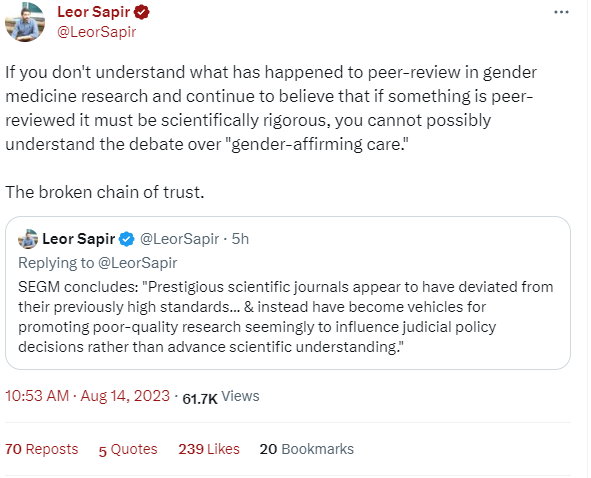Conservatives Are Now Blaming Science For Low Trans Regret Rates
A new study was published showing that transgender people who opt for top surgery have very little regret. Conservatives are predictably outraged at the conclusion, going as far as to blame science.
A study published last Wednesday in the prestigious medical journal JAMA Surgery found that the regret rate for transgender chest masculinization, commonly referred to as "top surgery," is extremely low. Almost none of the participants expressed regret following their procedures. The research is in line with many other studies which indicate low regret rates for transgender individuals — rates notably lower than many other prevalent medical procedures. This contradicts the accounts of political detransitioners who have testified in U.S. hearings, claiming that gender-affirming care leads to "regret and irreversible damage." In response, conservative anti-trans influencers and thought leaders erupted at the findings, offering wild and incredulous explanations, and some even challenged the validity of scientific medical journals themselves.
The study itself is titled, “Long-Term Regret and Satisfaction With Decision Following Gender-Affirming Mastectomy,” and sought to study the rate of regret and satisfaction after 2 years or more following gender affirming top surgery. The study’s results were stunning - in 139 surgery patients, the median regret score was 0/100 and the median satisfaction score was 5/5 with similar means as well. In other words… regret was virtually nonexistent in the study among post-op transgender people.
In fact, the regret was so low that many statistical techniques would not even work due to the uniformity of the numbers:
In this cross-sectional survey study of participants who underwent gender-affirming mastectomy 2.0 to 23.6 years ago, respondents had a high level of satisfaction with their decision and low rates of decisional regret. The median Satisfaction With Decision score was 5 on a 5-point scale, and the median decisional regret score was 0 on a 100-point scale. This extremely low level of regret and dissatisfaction and lack of variance in scores impeded the ability to determine meaningful associations among these results, clinical outcomes, and demographic information.
The numbers are in line with many other studies on satisfaction among transgender people. Detransition rates, for instance, have been pegged at somewhere between 1-3%, with transgender youth seeing very low detransition rates. Surgery regret is in line with at least 27 other studies that show a pooled regret rate of around 1% - compare this to regret rates from things like knee surgery, which can be as high as 30%. Gender affirming care appears to be extremely well tolerated with very low instances of regret when compared to other medically necessary care.
Unsurprisingly, the study provoked a significant reaction from conservative circles. Nearly every conservative figure associated with endorsing anti-trans legislation throughout the U.S. offered their perspective on the research. Leor Sapir of the Manhattan Institute, known for advocating against gender-affirming care, seemed to suggest that individuals discontented with their surgeries might not participate in surveys inquiring about potential regrets. Chloe Cole, a political detransitioner, appeared to hint at a similar stance. On Twitter, these reactions were met with widespread jest, with many drawing humorous parallels to how these people might treat Yelp reviews and customer service feedback:
When initial arguments fell short, these figures began to scrutinize the scientific process itself. SEGM, a known anti-trans group, issued a non-peer-reviewed "response" arguing that esteemed medical journals serve as "platforms for propagating politically-driven research." Leor Sapir criticized the peer-review system in gender medicine studies, labeling it as "a broken chain of trust." Perhaps most amusingly, Matt Walsh circulated a video asserting that scientific research holds little value, suggesting the low regret rates in the study are because “transgender people are just not admitting their regret” and are “lying to themselves.”
The intense conservative backlash, to the point of disputing reputable scientific journals, likely stems from the fact that reduced regret rates weaken a central narrative these figures have championed in legal and legislative spaces. Over the past three years, anti-trans entities have showcased political detransitioners, reminiscent of the ex-gay campaigns from the 1990s and 2000s, to argue that regrets over gender transition and detransition are widespread. Some have even asserted detransition rates of up to 80%, a claim that has been broadly debunked. Yet, research consistently struggles to find substantial evidence supporting this narrative. The rarity of detransition and regret is underscored by Florida's inability to enlist a single resident to bear witness against a lawsuit challenging the state's ban on gender-affirming care.
As we progress, courts will continue scrutinize evidence surrounding gender-affirming care in lawsuits aimed at repealing oppressive transgender care bans. Time and again, Republicans have failed in these legal battles, largely due to the absence of robust medical expertise and scientifically credible arguments. A case in point is Arkansas, where a full review of the facts by a Judge underscored the overwhelming scientific support for gender-affirming care. Should anti-trans groups and Republicans defending these statutes choose to dismiss respected scientific journals outright, their chances of prevailing in court will only diminish further.






I rate my irreversible damage 5 out of 5 stars, would recommend!
They still can't accept climate change despite scientific consensus, are we really this surprised that they're blithly dismissing science again?